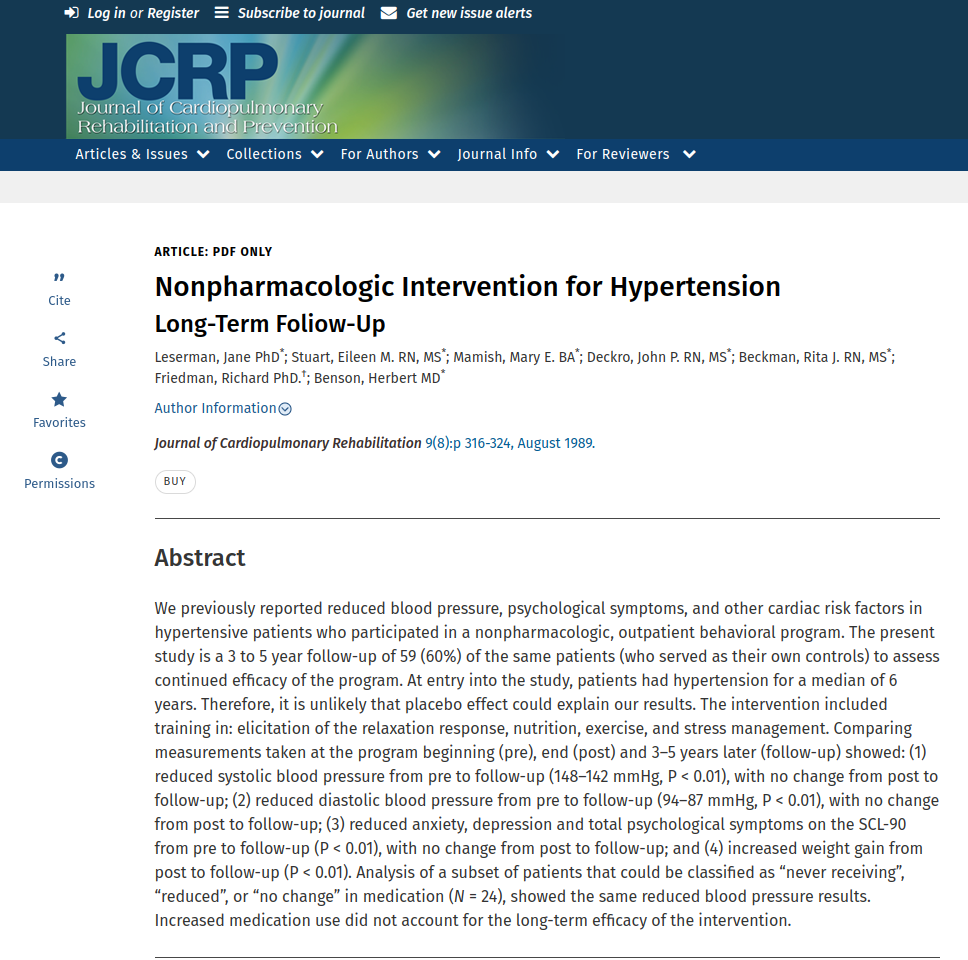We previously reported reduced blood pressure, psychological symptoms, and other cardiac risk factors in hypertensive patients who participated in a nonpharmacologic, outpatient behavioral program. The present study is a 3 to 5 year follow-up of 59 (60%) of the same patients (who served as their own controls) to assess continued efficacy of the program. At entry into the study, patients had hypertension for a median of 6 years. Therefore, it is unlikely that placebo effect could explain our results. The intervention included training in: elicitation of the relaxation response, nutrition, exercise, and stress management. Comparing measurements taken at the program beginning (pre), end (post) and 3–5 years later (follow-up) showed: (1) reduced systolic blood pressure from pre to follow-up (148–142 mmHg, P < 0.01), with no change from post to follow-up; (2) reduced diastolic blood pressure from pre to follow-up (94–87 mmHg, P < 0.01), with no change from post to follow-up; (3) reduced anxiety, depression and total psychological symptoms on the SCL-90 from pre to follow-up (P < 0.01), with no change from post to follow-up; and (4) increased weight gain from post to follow-up (P < 0.01). Analysis of a subset of patients that could be classified as “never receiving”, “reduced”, or “no change” in medication (N = 24), showed the same reduced blood pressure results. Increased medication use did not account for the long-term efficacy of the intervention.
Nonpharmacologic Intervention for Hypertension Long-Term Foliow-Up
Publication
Journal of Cardiopulmonary Rehabilitation
9(8):p 316-324
Abstract
Web and Email Links
Related Listings
Journal
Journal of Human Stress
Human pupillary dilatation after topical instillation of phenylephrine was assessed in a prospective, randomized, controlled experiment to measure alterations in α-end-organ responsivity after regular elicitation of the relaxation response. Baseline pupillometric measurements were taken in both experimental and control subjects. The experimental subjects then practiced daily a technique that elicited the relaxation response while the control subjects sat quietly for comparable periods […]
Journal
NeuroReport
Previous research indicates that long-term meditation practice is associated with altered resting electroencephalogram patterns, suggestive of long lasting changes in brain activity. We hypothesized that meditation practice might also be associated with changes in the brain's physical structure. Magnetic resonance imaging was used to assess cortical thickness in 20 participants with extensive Insight meditation experience, which involves focused attention to internal experiences. Brai […]
Journal
Calmer
In light of World Sleep Day this month, this week’s guest post features Valerie Teh, Calmer’s Client Manager and Self-Care Practitioner, who shares her expertise on how to explore and embrace intelligent rest to enhance quality sleep and nurture your overall wellbeing.

